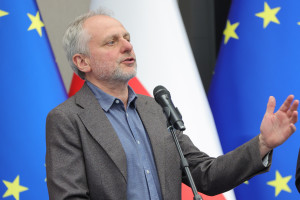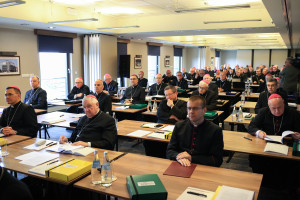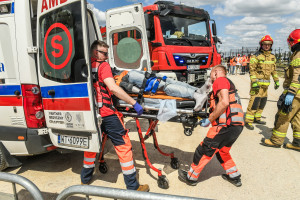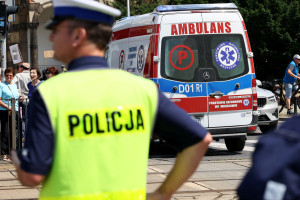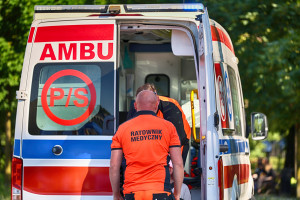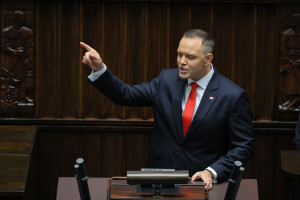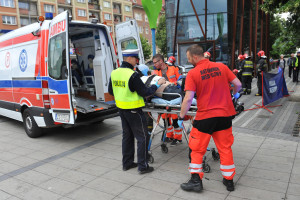Nurse beaten with IV drip, doctor threatened with lawsuit. "If we do nothing, the problem of aggression will grow."

- "Zero tolerance for aggression" - this is the slogan of the campaign organized by the Warsaw District Medical Chamber.
- During the conference inaugurating the campaign, representatives of the medical community emphasized that without taking action in various areas, the phenomenon of aggression against medical professionals will increase.
- The need for education and increasing public awareness of the role of medics, but also of responsibility for an attack on a medic was pointed out.
- It was also pointed out that reporting and real sanctions for verbal aggression are equally important, as it can turn into physical aggression.
On Tuesday (26 August), the social campaign "Zero tolerance for aggression" prepared by the Warsaw District Medical Chamber was launched.
OIL President Artur Drobniak emphasized that the problem of aggression has been growing in recent years, hence the need for actions undertaken by professional self-government bodies together with the police and prosecutor's office as part of creating space for discussion and implementing specific solutions.
Conference participants pointed out that aggression against people who help others on a daily basis, i.e. medical professionals, is particularly painful.
Łukasz Jankowski, President of the Supreme Medical Council, said the conference is a turning point in the medical community's approach to aggression. Until now, they've tried to explain what's happening and look for reasons. Meanwhile, a rule that should be applied from kindergarten onward is "he who hits is no longer right," which implies a complete lack of tolerance for aggression.
The head of the medical self-government stressed that this phenomenon also affects other countries and all of them admit that aggression is on the rise, and the problem begins earlier: at school, on the internet, on the street.
He said that other countries keep records of aggression in healthcare and report how many such cases have occurred. He pointed out that:
- in Spain last year 115 people were arrested for attacks on medics,
- In Italy , 16,000 cases of aggression against medics were reported,
- in Great Britain – 22,000 such incidents.
- If we do nothing, this problem will grow - warned Jankowski and reminded that other countries are implementing different solutions, for example "Türkiye is bringing the army into emergency departments", and Canada and the USA are toughening penalties.
In Poland, he said, medical professionals are demanding a clear path for reporting incidents, although he admitted that cooperation with the police and prosecutor's office in this regard has been much better in recent months. It's also about protecting the personal data of medical workers , as this data is accessible, and there have been cases of harassment of doctors, for example, by representatives of anti-vaccination groups.
The President of the NRL also drew attention to the phenomenon of deferred violence, i.e. patients threatening doctors with suing them or leaving negative comments.
Verbal, psychological, and physical aggression"A 98-year-old patient is dying of pneumonia, and the family is suing the doctor. The case has been going on for years. What is this if not aggression? We become victims when we try to help," said Łukasz Jankowski, adding that any attack on the safety of the doctor is always an attack on the safety of the patient.
Artur Drobniak reported that OIL started a survey on the scale of aggression last week and there are already 120 responses to the survey.
"The main form of aggression is verbal aggression – it affects nearly 100% of doctors, psychological aggression – 75%, passive aggression – 50%, and physical aggression – 20%. This is confirmed by international data," he enumerated.
He added that there were also numerous comments confirming that verbal and psychological abuse occurs primarily when services need to be extorted. "These include threats of negative comments or complaints to the National Health Fund, the Ombudsman for Professional Liability, or the Patient Rights Ombudsman. Physical abuse occurs primarily in patients with addiction problems," he said.
Moreover, doctors believe that the current regulations are insufficient and that there are no known sanctions for attacks on medics.
Anna Dudzińska , chairwoman of the Warsaw District Chamber of Nurses and Midwives, also admitted that violence against nurses has escalated in recent years. She said that many people still don't know that nurses have recently been granted special protection as a profession of public trust.
"Not a week goes by without a significant incident in some facility. I'm not talking about verbal incidents. Recently, a nurse was beaten with an IV pole. We try to organize training on how to deal with aggressive, impatient patients, but we need support from the medical facility, from the management, and from the board," she argued.
She added that nurses do not file civil complaints because, among other reasons, they fear for the safety of their families.
"Do we have to wait for a case like the one in Siedlce to happen? No, we have to react now. The fines are too small to stop this avalanche. (...) None of us feel safe going to the facility. Wards with agitated patients should have increased security. Every facility should have appropriate procedures and rules for cooperation with the services," she pointed out.
Joachim Budny from the Polish Medical Trade Union argued that buttons should be installed in hospital wards to notify emergency services so that doctors have access to this form of calling for help.
He also acknowledged that verbal incidents should be taken seriously , as they often escalate into physical aggression. Reporting procedures for such incidents should also be simplified.
There will be harsher penaltiesJacek Lachowicz from the Department of Criminal Law at the Ministry of Justice reminded that doctors and other medical professionals providing assistance are already protected as public officials , so sanctions for attacks against them are more severe. "Attacks target these individuals, but in a sense, they also target public order and the authority of the state, hence the stricter protection," he explained.
He recalled that the Ministry of Justice has prepared a draft law that aims to enhance this protection. Any attack against staff members that directly threatens their health or life will be punishable by up to five years in prison. At the request of the injured party, the court will order the publication of the judgment.
The second set of changes concerns the Code of Petty Offenses; disturbing the peace in a public place is already a petty offense, but under the bill, if it occurs in a medical facility or during a medical procedure, then, in addition to the arrest penalty , it will also be punishable by a fine of at least PLN 1,000. An expedited procedure will also be applied in these cases.
Services on the side of the medics. "Aggression often begins with words"Dariusz Walichnowski , Commander of the Warsaw Police, said that these are very good changes to the law, also expected by officers who have to intervene in such situations.
"Zero tolerance for any form of aggression. It starts with verbal aggression, because many people believe that verbal aggression is irrelevant, and that it's only a step away from it to actual actions, threats to health and life. It's unacceptable for a medical professional, who is supposed to save people's health or lives, to have to consider their own safety during their work," he argued.
Training sessions co-organized by the police for medics are intended to be helpful. These training sessions provide information on what to look for when filing a report.
He also emphasized that aggression most often occurs on the part of people under the influence of alcohol or other intoxicants, which is difficult to rule out. Aggression often takes a dynamic course, and the police arrive only after the incident has already occurred.
Małgorzata Szeroczyńska , Deputy District Prosecutor in Warsaw, argued that medics should report all instances of insults or offensive language. "These are important because aggression begins with words and escalates. If there are fines for these acts, it will be effective, because what hurts us Poles most is money," she stated, adding that if someone knew they would be fined 1,000 złoty for each such word, it might deter them.
She admitted that we also need to start with prevention and educational campaigns.
The Voivode of Mazovia, Mariusz Frankowski , also agreed that verbal aggression is the first step towards physical aggression, so fines and information about this penalty, as well as awareness of its inevitability, can act as a deterrent.
He emphasized that aggression often begins at the dispatch center level, with a phone call . He said it's impossible to dispatch the police every time an emergency medical team is dispatched, so dispatchers are trained and make decisions based on various signals as to whether additional security measures are necessary.
Copyrighted material - reprint rules are specified in the regulations .
rynekzdrowia


